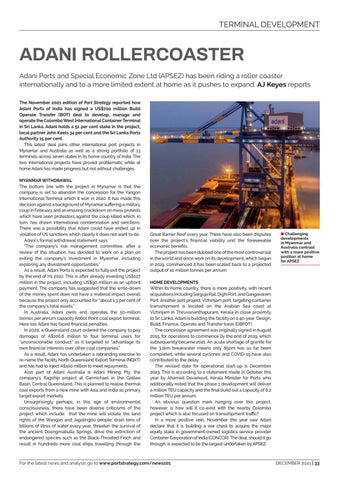TERMINAL DEVELOPMENT
ADANI ROLLERCOASTER Adani Ports and Special Economic Zone Ltd (APSEZ) has been riding a roller coaster internationally and to a more limited extent at home as it pushes to expand. AJ Keyes reports The November 2021 edition of Port Strategy reported how Adani Ports of India has signed a US$700 million Build Operate Transfer (BOT) deal to develop, manage and operate the Colombo West International Container Terminal in Sri Lanka. Adani holds a 51 per cent stake in the project, local partner John Keels 34 per cent and the Sri Lanka Ports Authority 15 per cent. This latest deal joins other international port projects in Mynamar and Australia as well as a strong portfolio of 13 terminals across seven states in its home country of India. The two international projects have proved problematic while at home Adani has made progress but not without challenges. MYANMAR WITHDRAWAL The bottom line with the project in Mynamar is that the company is set to abandon the concession for the Yangon International Terminal which it won in 2020. It has made this decision against a background of Mynamar suffering a military coup in February and an ensuing crackdown on mass protests which have seen protestors against the coup killed which, in turn, has drawn international condemnation and sanctions. There was a possibility that Adani could have ended up in violation of US sanctions which clearly it does not want to do. Adani’s formal withdrawal statement says: “The company’s risk management committee, after a review of the situation, has decided to work on a plan on exiting the company’s investment in Myanmar, including exploring any divestment opportunities.” As a result, Adani Ports is expected to fully exit the project by the end of H1 2022. This is after already investing US$127 million in the project, including US$90 million as an upfront payment. The company has suggested that the write-down of the money spent does not have a material impact overall because the project only accounted for “about 1.3 per cent of the company’s total assets.” In Australia, Adani owns and operates the 50-million tonnes per annum capacity Abbot Point coal export terminal. Here too Adani has faced financial penalties. In 2020, a Queensland court ordered the company to pay damages of A$106.8 million to four terminal users for “unconscionable conduct” as it targeted to “advantage its own financial interests over other coal companies.” As a result, Adani has undertaken a rebranding exercise to re-name the facility North Queensland Export Terminal (NQXT) and has had to inject A$100 million to meet repayments. Also part of Adani Australia is Adani Mining Pty, the company’s flagship project at Carmichael in the Galilee Basin, Central Queensland. This is planned to realise thermal coal exports from a new mine with Asia and India as primary target export markets. Unsurprisingly perhaps, in this age of environmental consciousness, there have been diverse criticisms of the project which include: that the mine will violate the land rights of the Wangan and Jagalingou people; drain tens of billions of litres of water every year, threaten the survival of the ancient Doongmabulla Springs, drive the extinction of endangered species such as the Black-Throated Finch and result in hundreds more coal ships travelling through the
Great Barrier Reef every year. There have also been disputes over the project’s financial viability and the foreseeable economic benefits. The project has been dubbed one of the most controversial in the world and since work on its development, which began in 2019, commenced it has been scaled back to a projected output of 10 million tonnes per annum.
8 Challenging developments in Myanmar and Australia contrast with a more positive position at home for APSEZ
HOME DEVELOPMENTS Within its home country, there is more positivity, with recent acquisitions including Sarguja Rail, Dighi Port, and Gangavaram Port. Another port project, Vizhinjam port, targeting container transshipment is located on the Arabian Sea coast at Vizhinjam in Thiruvananthapuram, Kerala in close proximity to Sri Lanka. Adani is building the facility on a 40-year Design, Build, Finance, Operate and Transfer basis (DBFOT). The concession agreement was originally signed in August 2015, for operations to commence by the end of 2019, which subsequently became 2021. An acute shortage of granite for the 3.1km breakwater means only 850m has so far been completed, while several cyclones and COVID-19 have also contributed to the delay. The revised date for operational start-up is December 2023. This is according to a statement made in October this year by Ahamed Devarkovil, Kerala Minister for Ports who additionally noted that the phase 1 development will deliver a million TEU capacity and the final build out a capacity of 6.2 million TEU per annum. An obvious question mark hanging over this project, however, is how will it co-exist with the nearby Colombo project which is also focused on transshipment traffic? In a more positive vein, November this year saw Adani declare that it is building a war chest to acquire the major equity stake in government-owned logistics service provider Container Corporation of India (CONCOR). The deal, should it go through, is expected to be the largest undertaken by APSEZ.
For the latest news and analysis go to www.portstrategy.com/news101
DECEMBER 2021 | 33














